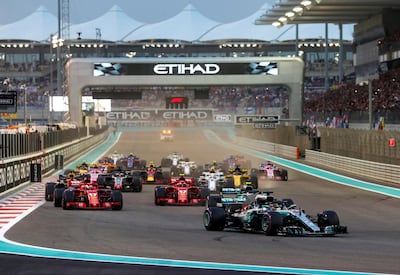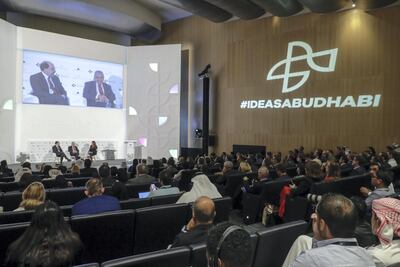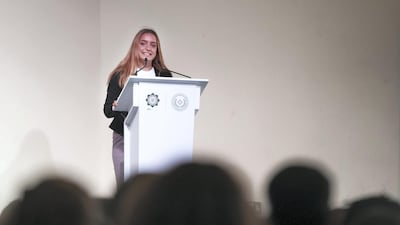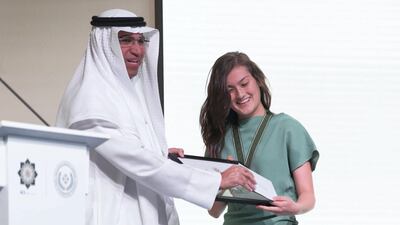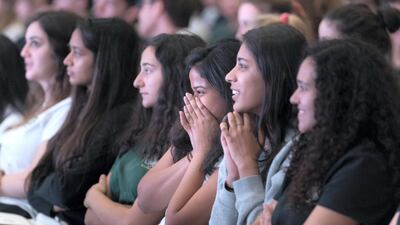Haitham Zamzam Al Hammadi attended the American Community School of Abu Dhabi and after graduating maintained his close relationship with the school as a board member and trustee. He went on to work for the Abu Dhabi Government before sadly passing away in 2017.
In his honour, a Medal of International Friendship was launched last year to be awarded to one Junior ACS student for their contribution to global citizenry and reinforcing the school’s core values of curiosity, courage, compassion and integrity.
Elif Narbay was the first recipient of the Medal - and what a year it has been for her: volunteering at the Special Olympics, attending the Abu Dhabi Ideas Forum, and even going behind the scenes at the Grand Prix.
Here, she looks back at a thrilling twelve months…
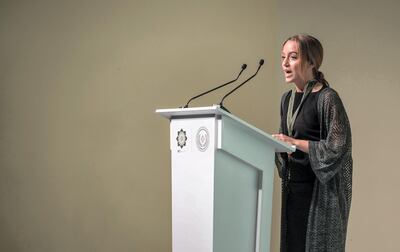
In 2000, 23,505 babies were born in Abu Dhabi. And I was one of those lucky infants.
“الحمدلله على سلامتكم” (‘God Bless Her Soul’ in Arabic) echoed around the room as I entered this world. I truly was blessed. However, my awareness of this notion—of being born and raised in this sublime desert—did not truly come to subsistence until the past few years as I prepared to leave the place I have called home for the past 18 years.
I became accustomed to the ever-present bubble that surrounded me: The tightly knit community, the same three malls, the same scorching sun. However, my nine years at ACS (the American Community School of Abu Dhabi), gave me opportunities to explore beyond this bubble — travelling abroad 14 times to eight different countries for team-building and grade-level retreats, to memorable choir and band festival tours, to sports tournaments, and to life-changing service trips. All of the experiences deepened my understanding of life: offering chances to interact with so many different people, immersing myself in alternate lifestyles and cultures, and enabling me to build a deeper understanding of my own culture and personal identity.
It was the summer of my junior year, while attending a two-week UCLA nanoscience programme, that I realised the values this multifaceted city had ingrained in me. Values that I could not have comprehended within a typical classroom setting. Growing up in Abu Dhabi introduced me to a diversity of people and it allowed me to have experiences outside of my community.
I was one of only two international students selected to attend the UCLA camp. I was surrounded by other science geeks like myself researching creative solutions primarily regarding climate change utilising nanoscale approaches. Amidst the collaborative atmosphere that I felt working with other students who shared my passion for science, I still at times felt lonely. The fact that I was thousands of miles away from home didn’t help, but it was those thousands of miles of separation that finally helped me to see the value of my desert family. It was also questions like “Do you ride a camel to school”, “Abu Dhabi… that’s in Saudi Arabia, right?” or “Do you know how to swim, since you live in a desert?” that reminded me of how lucky I was to have been raised in an international setting where I was aware of and could understand the wider world.
Once the programme was over I visited my mother country, Turkey, with a renewed vision of the global identity I possessed. The next step was figuring out how to convey that in my college applications. Returning to Abu Dhabi commenced a bittersweet countdown—the end to my new beginning. Little did I know that this would be one of the most enriching years of my life, mainly attributed to the Haitham Zamzam Al Hammadi Medal of International Friendship presented to a junior student for the positive and productive global citizenry at ACS. With this award came numerous responsibilities and incredible opportunities—each one contributing a new piece to my global identity puzzle.
Formula One Etihad Airways Abu Dhabi Grand Prix
My family and I were invited to spend the day in the Paddock Club while I got a tour of the circuit, race control and pit lane with a selected group of NYUAD Students.
Learning all the behind-the-scenes groundwork of such a global event and getting to hear the details that go into preparing such a large-scale endeavour—especially understanding the magnitude of the project in terms of the number of people from different fields and backgrounds working on it—was definitely eye-opening. Conversely, it also made me think about how the time, energy, and money to create this unique and valuable event was spent:
How could these diverse, wide-scale projects not only contribute to the UAE’s economy but also to the betterment of our globe as Abu Dhabi continues to grow as a touristic and cultural hub for the world?
NYCFC Pre-season Training at Emirates Palace
As a student-athlete who will be competing at collegiate level, it was interesting to learn about the business side of athletics at a professional level. Through meeting and talking with the people who lead and direct the City Football Group, I was able to appreciate the symbiotic relationship of the UAE and the teams. While the UAE gains economic benefit, athletes are able to utilise this region's climate and infrastructure—both gaining cultural insight from each other.
Special Olympics World Games Abu Dhabi 2019

Working with the Special Olympics was thrilling for me as I got to blend my service leadership and duties at ACS with service-learning outside of my school context. Even though my main tasks included designing tickets and helping to organise the half marathon, my takeaway was not the skills I acquired, but a more conceptual understanding of what this event meant. Sifting through pictures from previous Special Olympics, I realised the impact of this event and the part Abu Dhabi got to play in its story.
Yes, service is an essential aspect of being a student at ACS. However, this experience solidified that it is more than just part of my academic upbringing—it will perennially be embedded in my life endeavours.
Joining the World Affairs Council Teacher’s Delegation visit to the UAE
As part of the delegation agenda, the visit to the UAE National Space Agency fortified the notion of the UAE’s globality. Despite the short amount of time the country has been a part of the space programme, the progress they have made is exponential due to the international connections they nurtured.
Grounded in civic pride, the programme has since embraced the global outreach needed to succeed. From this I understood that it is critical to adopt a multinational mindset in order for humanity to progress and to connect our stories—no longer alienating our individual narratives.
And maybe I could be a part of this story one day, as well.
Abu Dhabi Ideas Forum 2019
This was by far my favourite event. My mind is still buzzing about all the discussions that took place during this two-day event: from cybersecurity discussions with the world's greatest hacker, to developments in neuroscience with the leading experts in the field, to a talk about the new world order with former and current prime ministers around the world. To be a part of these conversations that revolved around the most pressing issues in society today was overwhelming, but also invigorating.
It is reassuring to know that discussions like these are happening, especially at a time when ignorance is overshadowing the tolerance we urgently need to embrace. Being one of the only young representatives, it made me wonder how we can spark more interest and give more access to dialogues such as these. I feel that we are at a crucial point that if we don’t address the ethics behind these global advancements now, my generation won’t get the chance to.
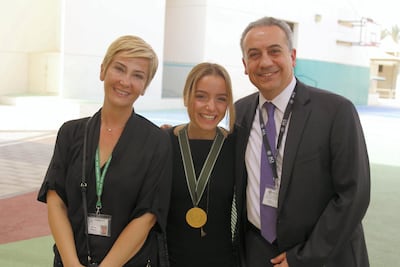
In Abu Dhabi, and particularly at my high school, being a global and productive citizen stands at the core of our community. Even though we might not all be driven by STEM, we use our varying passions to have a positive impact on society through a solid ethic of interconnectedness and the recognition of how our actions affect more than just our local community.
Next year, I will be attending Chapman University, California to study biochemistry and molecular biology. As a biochemistry major, not only will I be exploring the relationship between chemical processes and living organisms, but also joining my academic passions with my personal ambitions in an effort to address human problems with cutting-edge scientific solutions. This past year has not only confirmed this aspiration, but it has also helped me to understand that this cannot be possible without my global mindset. The mindset that has been nurtured in me since the day I was born—and one that I will use to help to guide myself and others to contribute to the betterment of humanity.

